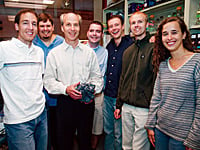The DNA-reader in our cells

Roger D. Kornberg Roger Kornberg surrounded by some of his current co-workers shortly after the announcement of the award of the Nobel Prize in Chemistry for 2006. In his hands he is holding the model of RNA polymerase that resulted from his work. |
Before our bodies can make use of the information stored in the genes, the relevant parts of the DNA-molecule must first be copied. The copy – messenger RNA – is used as a blueprint in creating the proteins that in their turn construct the structure and functions of the body. The copying process is called transcription and is continually taking place in all living creatures. If transcription stops, organisms quickly die. Roger Kornberg’s major contribution is his success in creating a molecular image of the transcription process in full flow. |
Nobel Prizes and laureates
Six prizes were awarded for achievements that have conferred the greatest benefit to humankind. The 12 laureates' work and discoveries range from proteins' structures and machine learning to fighting for a world free of nuclear weapons.
See them all presented here.
Explore prizes and laureates
Look for popular awards and laureates in different fields, and discover the history of the Nobel Prize.
